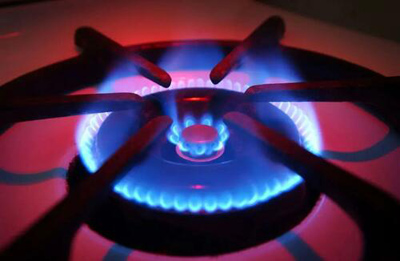Heating Homes With Natural Gas Is More Than 40% Cheaper Than Electricity: US EIA
Naveen Athrappully
 Natural gas remains the main source of heating in American homes despite the current administration’s electrification push. Natural gas remains the main source of heating in American homes despite the current administration’s electrification push.
Heating homes this winter using natural gas is estimated to cut down energy costs by more than 40 percent compared to electricity, according to a recent report by the U.S. Energy Information Administration (EIA).
Households using electricity to heat homes are projected to pay $1,063 on average between November and March, according to a Nov. 7 winter fuels outlook report by the EIA. In comparison, households using natural gas are only expected to shell out $601.
Region-wise, the biggest difference is in the Midwest, where electric heating is expected to cost $1,213—more than double the gas cost of $581. In the Northeast, gas heating is projected to be cheaper by $704, in the South by $507, and in the West by $417.
Natural gas heating is also cheaper compared to other alternative energy sources such as propane and heating oil, which are expected to cost $1,343 and $1,851 respectively.
High heating costs borne by households using electricity come as the Biden administration is pushing an electrification agenda.
The administration is already imposing several restrictions on the use of gas-powered appliances. The U.S. Department of Energy (DOE) has announced new efficiency standards for residential gas furnaces, pool pumps, battery chargers, dehumidifiers, ceiling fans, incandescent light bulbs, and gas stoves that would severely curtail their use.
Secondly, the Biden administration is offering rebates on the use of electric appliances in homes. The 2022 Inflation Reduction Act set aside $8.8 billion in rebates for home energy efficiency and electrification projects.
In a June 2 interview with The Epoch Times, O.H. Skinner, executive director of the Alliance for Consumers, said the Biden administration’s push for electrification of home appliances is bad news for Americans.
“That will make it so that nearly the majority of the current products on the market don’t meet the standards and have to be redesigned or removed from the market,” he said.
“Everyday things that people actually want are going to get more expensive or disappear, and the products that will be available will be more expensive but not better. People are going to wonder why life is worse.”
At present, there are more homes using natural gas than electricity in the United States when it comes to heating.
“Natural gas is the main space heating fuel in 46 percent of U.S. homes, making it the most widely used residential heating fuel in the country,” the EIA report reads.
“The share of U.S. homes that use electricity as a primary space heating fuel has grown to 42 percent from 38 percent 10 years ago.”
The Biden administration’s electrification push has attracted criticism for its unnecessarily burdening American consumers. In August, Rep. Stephanie Bice (R-Okla.) raised concerns about the DOE’s energy efficiency standards on ceiling fans, arguing that it's against consumer choice and would result in higher prices.
“We are currently in a period of hot summer weather but also a time of high inflation. It is unconscionable that your department would seek to limit the options of the American people to stay cool in their own homes at a time like this,” she wrote in an Aug. 25 letter to Energy Secretary Jennifer Granholm.
More Than Triple the Cost
An August report by the DOE revealed that natural gas is a far cheaper energy source than electricity. The cost of electricity was calculated to be $46.19 per million British thermal units (Btu). Natural gas cost only came to $13.97 per million Btu, which is 3.3 times cheaper than electricity.
The Energy Department’s analysis confirms that there's a “very clear and substantial cost-advantage of natural gas,” Karen Harbert, president of the American Gas Association (AGA), said in an Aug. 28 statement.
“Our nation’s domestic abundance of natural gas means American customers pay a fraction of what customers pay for other energy sources here at home and see significant savings compared to energy costs globally,” Ms. Harbert said.
“Our industry invests $91 million every day to ensure our vast modern delivery infrastructure provides the reliability Americans expect. America’s natural gas is critical to American and global energy security.”
The AGA estimates that households using natural gas for heating, drying clothes, and cooking save about $1,068 per annum on average compared to homes that use electricity for such activities. Through 2050, natural gas prices are projected to be half to a third of the price of other fuels.
Since 1970, the typical residential property has cut consumption by half even though homes have become bigger. AGA credits this to “steady improvements in building and appliance energy efficiency, and the positive impacts of gas utility energy efficiency program.”
President Joe Biden has implemented several steps to limit natural gas production ever since he assumed office back in 2021.
This includes a moratorium on oil and natural gas leasing activities in the Arctic National Wildlife Refuge, imposing new taxes on gas extraction through the Inflation Reduction Act, and proposing revisions to the National Environmental Policy Act guidance, which would make it harder to permit natural gas projects.
In September, a bipartisan coalition of 25 governors committed to decarbonizing buildings across the United States.
“Decarbonizing buildings through accelerated energy efficiency and electrification is an imperative ... to reduce emissions and achieve U.S. climate targets,” a Sept. 21 statement by the U.S. Climate Alliance reads.
Speaking to Daily Caller, Tom Pyle, president of the American Energy Alliance, said that the “political appointees in the White House ... are more interested in helping their big money backers in the green movement than they are in helping provide relief for working-class American families.”
“Higher electricity prices don’t hurt wealthy coastal elites, but they crush the poor, seniors, and those living on fixed incomes,” Mr. Pyle said.
In a March 21 letter to Ms. Granholm, House Republicans insisted that the department’s rules restricting gas appliances “has no basis in law or within your jurisdiction.”
"[The DOE] has enjoyed bipartisan support," it reads. "[But] your actions to appease the Biden Administration’s radical climate agenda does not reflect well upon the Department.”

Naveen Athrappully is a news reporter covering business and world events at The Epoch Times.
www.theepochtimes.com
| ![[Most Recent Quotes from www.kitco.com]](http://www.kitconet.com/images/live/s_gold.gif)
![[Most Recent USD from www.kitco.com]](http://www.weblinks247.com/indexes/idx24_usd_en_2.gif)
![[Most Recent Quotes from www.kitco.com]](http://www.kitconet.com/images/live/s_silv.gif)


